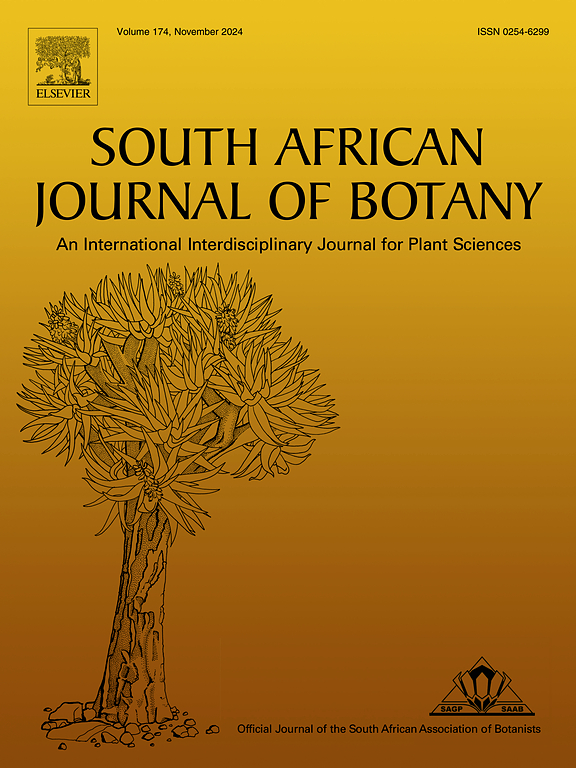Sclerocarya birrea 和 Terminalia prunioides:植物化学筛选和通过调节表皮生长因子受体、血管内皮生长因子、MACC1、CYFRA 21-1 和 CD 95 基因表达协同抑制宫颈癌细胞增殖
IF 2.7
3区 生物学
Q2 PLANT SCIENCES
引用次数: 0
摘要
癌症是导致全球死亡的主要原因之一。传统药物价格昂贵,而且据报道有副作用。这就促使癌症研究人员努力寻找副作用小或无副作用的廉价解决方案。本研究旨在筛选植物化学成分,以及 Sclerocarya birrea 果实外果皮(SBFE)和 Terminalia prunioides 豆荚提取物(TPPE)对人类宫颈癌细胞系(HeLa)的抗增殖作用。提取物的植物化学成分采用 HPLC 和 LC-MS/MS 进行定性评估,抗增殖作用采用 4-[-3(4-碘苯基)-2-(4-硝基苯基)-2H-5-四唑]-1,3-苯磺酸盐(WST-1)测定法。通过 HPLC 和 LC-MS/MS 分析,鉴定并量化了 24 种多酚代谢物,其中莽草酸(3.6014 毫克/克-1)、没食子酸(40.8283 毫克/克-1)和槲皮素-3-d-木糖苷(3.4677 毫克/克-1)为主要代谢物。提取物的抗增殖作用结果被用于制作 3 种潜在的抗癌制剂。此外,提取物和制剂对宫颈癌标志物的表达也有影响:通过逆转录定量聚合酶链式反应(RT-qPCR)评估了表皮生长因子受体(EGFR)、结肠癌转移相关因子 1(MACC1)、血管内皮生长因子(VEGF)、细胞角蛋白片段(CYFRA 21-1)和集群分化 95(CD95)等宫颈癌标志物的表达。两种植物的甲醇和乙酸乙酯提取物中的皂苷、单宁酸、黄酮类、酚类、萜类、强心苷和类固醇均呈阳性。甲醇提取物最有效,对 SBFE 和 TPPE 的 IC50 值分别为 75 µg/mL 和 190 µg/mL。配方M1E1M2E2 和 M1M2 的 IC50 值分别为 77 微克/毫升和 83 微克/毫升。所有处理均可下调表皮生长因子受体、血管内皮生长因子、MACC1、CYFRA 21-1 的 mRNA 表达,上调 CD 95 mRNA 表达。制剂比单个提取物对 HeLa 细胞更有效。不过,还需要进一步测试其他可能的作用机制,并分离出植物化合物。本文章由计算机程序翻译,如有差异,请以英文原文为准。
Sclerocarya birrea and Terminalia prunioides: Phytochemical screening and synergistic inhibition of cervical cancer cells proliferation through modulation of EGFR, VEGF, MACC1, CYFRA 21-1, and CD 95 gene expressions
Cancer is one of the leading causes of death globally. Conventional drugs are expensive and have been reported to have side effects. This directs efforts in cancer research to search for inexpensive solutions with less or no side effects. This study aimed at screening for phytochemicals and the antiproliferative effects of Sclerocarya birrea fruit exocarp (SBFE) and Terminalia prunioides pods extracts (TPPE) on human cervical cancer cell line (HeLa). Extracts were qualitatively evaluated for their phytochemicals using HPLC and LC-MS/MS, and the antiproliferative effects by 4-[-3(4-Iodophenyl)-2-(4-nitro-phenyl)-2H-5-tetrazolio]-1,3-benzene sulfonate (WST-1) assay. HPLC and LC-MS/MS analysis led to identification and quantification of 24 polyphenolic metabolites amongst which shikimic acid (3.6014 mg g-1), gallic acid (40.8283 mg g-1), and quercetin-3-d-xyloside (3.4677 mg g-1) as the major metabolites. Results from antiproliferative effects of extracts were used to make 3 potential anticancer formulations. Furthermore, effects of extracts and formulations on the expressions of cervical cancer markers: Epidermal Growth Factor Receptor (EGFR), Metastasis-Associated in Colon Cancer 1 (MACC1), Vascular Endothelial Growth Factor (VEGF), Cytokeratin Fragment (CYFRA 21-1), and Cluster differentiation 95 (CD95) were evaluated by Reverse transcription quantitative Polymerase Chain Reaction (RT-qPCR). Methanol and ethyl acetate extracts of both plants tested positive for saponins, tannins, flavonoids, phenols, terpenoids, cardiac glycoside and steroids. Methanol extracts were the most effective with IC50 values of 75 µg/mL and 190 µg/mL for SBFE and TPPE respectively. The formulations: M1E1M2E2 and M1M2 had IC50 values of 77 µg/mL and 83 µg/mL respectively. All treatments downregulated mRNA expression of EGFR, VEGF, MACC1, CYFRA 21-1, and upregulated CD 95 mRNA expression. Formulations were more effective than individual extracts against HeLa cells. However, there is need for further testing for other possible mechanisms of action and isolation of phytocompounds.
求助全文
通过发布文献求助,成功后即可免费获取论文全文。
去求助
来源期刊

South African Journal of Botany
生物-植物科学
CiteScore
5.20
自引率
9.70%
发文量
709
审稿时长
61 days
期刊介绍:
The South African Journal of Botany publishes original papers that deal with the classification, biodiversity, morphology, physiology, molecular biology, ecology, biotechnology, ethnobotany and other botanically related aspects of species that are of importance to southern Africa. Manuscripts dealing with significant new findings on other species of the world and general botanical principles will also be considered and are encouraged.
 求助内容:
求助内容: 应助结果提醒方式:
应助结果提醒方式:


